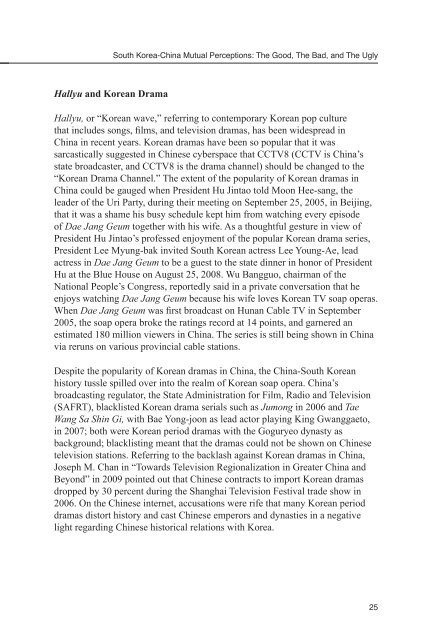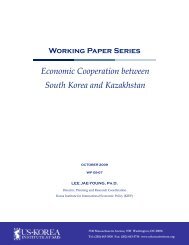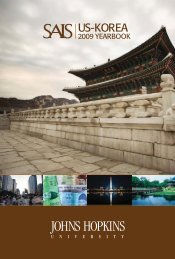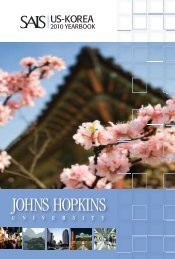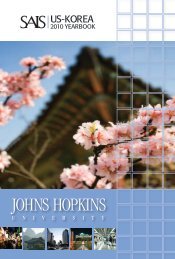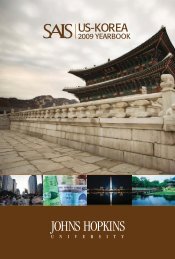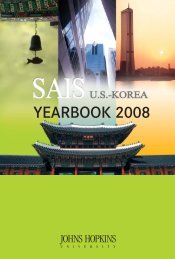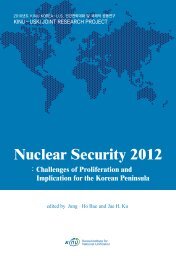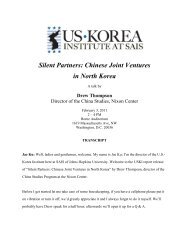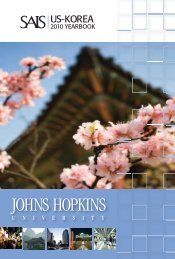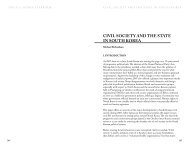US-Korea Institute at SAIS
US-Korea Institute at SAIS
US-Korea Institute at SAIS
- No tags were found...
Create successful ePaper yourself
Turn your PDF publications into a flip-book with our unique Google optimized e-Paper software.
South <strong>Korea</strong>-China Mutual Perceptions: The Good, The Bad, and The Ugly<br />
Hallyu and <strong>Korea</strong>n Drama<br />
Hallyu, or “<strong>Korea</strong>n wave,” referring to contemporary <strong>Korea</strong>n pop culture<br />
th<strong>at</strong> includes songs, films, and television dramas, has been widespread in<br />
China in recent years. <strong>Korea</strong>n dramas have been so popular th<strong>at</strong> it was<br />
sarcastically suggested in Chinese cyberspace th<strong>at</strong> CCTV8 (CCTV is China’s<br />
st<strong>at</strong>e broadcaster, and CCTV8 is the drama channel) should be changed to the<br />
“<strong>Korea</strong>n Drama Channel.” The extent of the popularity of <strong>Korea</strong>n dramas in<br />
China could be gauged when President Hu Jintao told Moon Hee-sang, the<br />
leader of the Uri Party, during their meeting on September 25, 2005, in Beijing,<br />
th<strong>at</strong> it was a shame his busy schedule kept him from w<strong>at</strong>ching every episode<br />
of Dae Jang Geum together with his wife. As a thoughtful gesture in view of<br />
President Hu Jintao’s professed enjoyment of the popular <strong>Korea</strong>n drama series,<br />
President Lee Myung-bak invited South <strong>Korea</strong>n actress Lee Young-Ae, lead<br />
actress in Dae Jang Geum to be a guest to the st<strong>at</strong>e dinner in honor of President<br />
Hu <strong>at</strong> the Blue House on August 25, 2008. Wu Bangguo, chairman of the<br />
N<strong>at</strong>ional People’s Congress, reportedly said in a priv<strong>at</strong>e convers<strong>at</strong>ion th<strong>at</strong> he<br />
enjoys w<strong>at</strong>ching Dae Jang Geum because his wife loves <strong>Korea</strong>n TV soap operas.<br />
When Dae Jang Geum was first broadcast on Hunan Cable TV in September<br />
2005, the soap opera broke the r<strong>at</strong>ings record <strong>at</strong> 14 points, and garnered an<br />
estim<strong>at</strong>ed 180 million viewers in China. The series is still being shown in China<br />
via reruns on various provincial cable st<strong>at</strong>ions.<br />
Despite the popularity of <strong>Korea</strong>n dramas in China, the China-South <strong>Korea</strong>n<br />
history tussle spilled over into the realm of <strong>Korea</strong>n soap opera. China’s<br />
broadcasting regul<strong>at</strong>or, the St<strong>at</strong>e Administr<strong>at</strong>ion for Film, Radio and Television<br />
(SAFRT), blacklisted <strong>Korea</strong>n drama serials such as Jumong in 2006 and Tae<br />
Wang Sa Shin Gi, with Bae Yong-joon as lead actor playing King Gwanggaeto,<br />
in 2007; both were <strong>Korea</strong>n period dramas with the Goguryeo dynasty as<br />
background; blacklisting meant th<strong>at</strong> the dramas could not be shown on Chinese<br />
television st<strong>at</strong>ions. Referring to the backlash against <strong>Korea</strong>n dramas in China,<br />
Joseph M. Chan in “Towards Television Regionaliz<strong>at</strong>ion in Gre<strong>at</strong>er China and<br />
Beyond” in 2009 pointed out th<strong>at</strong> Chinese contracts to import <strong>Korea</strong>n dramas<br />
dropped by 30 percent during the Shanghai Television Festival trade show in<br />
2006. On the Chinese internet, accus<strong>at</strong>ions were rife th<strong>at</strong> many <strong>Korea</strong>n period<br />
dramas distort history and cast Chinese emperors and dynasties in a neg<strong>at</strong>ive<br />
light regarding Chinese historical rel<strong>at</strong>ions with <strong>Korea</strong>.<br />
25


